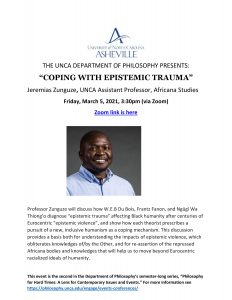
Presented by Dr. Jeremias Zunguze
This presentation discusses how W.E.B Du Bois, Frantz Fanon, and Ngūgī Wa Thiong’o diagnose “epistemic trauma” affecting Black humanity after centuries of Eurocentric “epistemic violence.” Epistemic violence, according to Gayatri Spivak, is an obliteration of knowledge of the Other by dominant ideologies. By “epistemic trauma” I mean the psychic consequences of epistemic violence, in which dominant language and systems of knowing continue to fail to properly represent an inclusive humanism or a value system that prioritizes the welfare, worth, and dignity of specific groups of human beings, throwing them into an existential downward spiral. W.E.B Du Bois, for instance, diagnoses a “double consciousness” affecting African-Americans, reproduced by the “color line,” while prescribing the praxis of “spiritual striving” and a concrete meaning of humanism as a restorative mechanism. Fanon identifies “violence” as a condition to which the colonized are reduced, prescribing “political decolonization” and “epistemic decolonization” as acts that trigger a “psycho-effective equilibrium.” Wa Thiong’o calls for “decolonizing the mind” by reclaiming repressed indigenous languages as a way of repairing the “mental colonization” affecting representation, particularly, of African consciousness, which predominantly continues to be represented through European languages. Du Bois, Fanon, and Wa Thiong’o envision a new humanism founded on decolonization or disavowal of harmful effects of colonialism and assertion of repressed African bodies, knowledges, and systems of knowing; thus, moving beyond Eurocentric racialized ideals of humanity.
Jeremias Zunguze is an Assistant Professor of Africana Studies and a Humanities 324 Coordinator at the University of North Carolina, Asheville. He holds a Ph.D. in Hispanic Languages and Literatures from the University of California, Berkeley. His research interests include Africana critical theory and decolonizing studies. Below are some of his publications:
- Re-Reading Cultural Producers in Portuguese Language: Ancestrality as a Decolonial Project. Under contract with Lexington Books/Rowman and Littlefield and forthcoming in 2021.
- “Coping with Epistemic Trauma: The Africana Pursuit for New Humanity.” Peer-reviewed and published in Public Philosophy Journal (PPJ), Fall 2019.
- “Debunking the Myth of the Doctrine of Discovery of Africa” in Africana Studies: A Survey of Africa and the African Diaspora, 4th Edition, edited by Mario Azevedo. Carolina Academic Press, 2019.